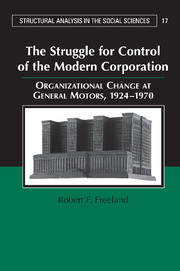 The Struggle for Control of the Modern Corporation
The Struggle for Control of the Modern Corporation Book contents
- Frontmatter
- Contents
- List of Figures and Tables
- Acknowledgments
- 1 The Modern Corporation and the Problem of Order
- 2 Creating Corporate Order: Conflicting Versions of Decentralization at GM, 1921–1933
- 3 Administrative Centralization of the M-form, 1934–1941
- 4 Participative Decentralization Redefined: Mobilizing for War Production, 1941–1945
- 5 The Split between Finance and Operations: Postwar Problems and Organization Structure, 1945–1948
- 6 Consent as an Organizational Weapon: Coalition Politics and the Destruction of Cooperation, 1948–1958
- 7 Consent Destroyed: The Decline and Fall of General Motors, 1958–1980
- 8 Conclusion
- Appendix: General Motors' Financial Performance, 1921–1987
- References
- Index
4 - Participative Decentralization Redefined: Mobilizing for War Production, 1941–1945
Published online by Cambridge University Press: 05 August 2011
- Frontmatter
- Contents
- List of Figures and Tables
- Acknowledgments
- 1 The Modern Corporation and the Problem of Order
- 2 Creating Corporate Order: Conflicting Versions of Decentralization at GM, 1921–1933
- 3 Administrative Centralization of the M-form, 1934–1941
- 4 Participative Decentralization Redefined: Mobilizing for War Production, 1941–1945
- 5 The Split between Finance and Operations: Postwar Problems and Organization Structure, 1945–1948
- 6 Consent as an Organizational Weapon: Coalition Politics and the Destruction of Cooperation, 1948–1958
- 7 Consent Destroyed: The Decline and Fall of General Motors, 1958–1980
- 8 Conclusion
- Appendix: General Motors' Financial Performance, 1921–1987
- References
- Index
Summary
The outbreak of World War II changed the conditions that had led to administrative centralization and introduced extreme uncertainty for GM and other manufacturers. Virtually overnight GM ceased manufacturing automobiles and converted to the production of military equipment. The uncertainties associated with war production imposed contradictory organizational imperatives that taxed GM's existing structure. On the one hand, this abrupt change called for greater decentralization and increased the need for divisional consent. The need to design, modify, and produce a large number of new and diverse products in a limited amount of time greatly increased uncertainty in the areas of manufacturing and engineering. Moreover, the fact that the different divisions were making extremely diverse and dissimilar products meant that each was again producing for a separate “market.” The technical uncertainty and market differentiation created by wartime production increased the importance of divisional knowledge and consent. Yet in other areas, the war created a need for greater centralization. The conversion to military production intensified the need for quick decision-making and uniform policy. GM's method of formulating and approving policies through review and discussion in a number of committees proved to be too cumbersome and slow for wartime conditions and would have to be streamlined.
In order to address the contradictory imperatives imposed by the war, GM modified its organizational structure several times during the period between 1942 and 1945. Except for a brief period of extreme centralization in 1942, most of the changes made during the war marked a return to and transformation of participative decentralization.
- Type
- Chapter
- Information
- The Struggle for Control of the Modern CorporationOrganizational Change at General Motors, 1924–1970, pp. 127 - 174Publisher: Cambridge University PressPrint publication year: 2000


